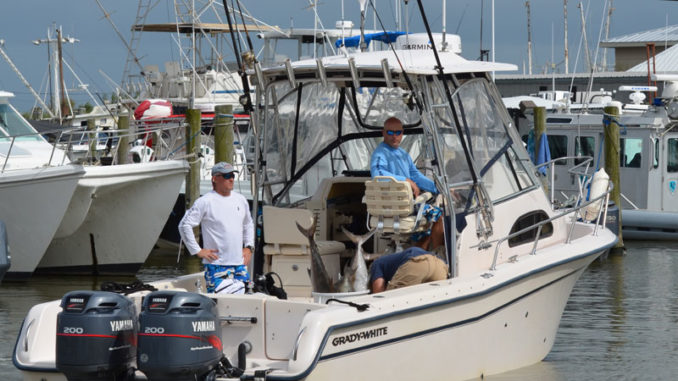
A St. Tammany Parish lawmaker is pushing legislation that would overturn a longstanding rule at the Department of Natural Resources to place charter fishing captains on equal footing with commercial fishermen.
Over the past two terms of state government, more attention has been given to how charter captains straddle the commercial and recreational worlds. The Department of Wildlife and Fisheries, for example, already recognizes captains as commercial fishermen and next year a legislative proposal will be floated for the same shared designation at the Department of Revenue for tax purposes.
Right now, however, charter captains are fighting in the ongoing regular session to revamp a DNR rule so they can participate in a state-sponsored insurance fund that currently serves the commercial fishing industry.
HCR 55 by Robert Owen, R-Slidell, would add charter fishing guides to the definition of commercial fishermen in DNR’s administrative rules — but only those verified as earning more than 50 percent of their income from guide services.
If passed, the rule change would grant charter captains access to the Fisherman’s Gear Compensation Fund. Created in 1979, the fund offers financial assistance to commercial fishermen for vessel and gear expenses affiliated with hitting or snagging obstructions or hazards in the water.
“We’re not trying to milk the system in any way,” Owen told the House Natural Resources Committee this week. “We’re not trying to get a leg up on commercial fishermen in any way, shape or form. We just want a level playing field.”
The impact
The real sticking point is just how much money charter captains would siphon from the fund. Lawmakers on the committee have requested a fiscal analysis of the proposal, and until that’s finished and made public, no further votes will be taken.
Owen estimated the impact of adding charter captains to the fund could be anywhere from “just thousands” to “less than $100,000.” He and other supporters argue there’s plenty enough money in the fund to go around.
The Fisherman’s Gear Compensation Fund is supported by a $1,000 fee that’s charged against mineral lessees and right-of-way holders in the coastal zone, primary pipeline operators. The fees are typically assessed every three years or so, when the fund’s balance reaches $250,000 or less. When triggered, those fee bills on average bring in $2.3 million for the fund.
Claims from commercial fishermen are filed with DNR, which then investigates them. Participants are allowed only three claims per year, with a maximum payout of $5,000 per instance. Overall, there are roughly 120 claims filed with the DNR fund annually.
Richard Fischer of the Louisiana Charter Boat Association told lawmakers this week it’s time to view his industry through a different lens. “(Charter captains) are simply the Uber or taxi service that takes customers from the dock to the fishing spots and back to the dock,” he said.
Charter captains in the state
Fischer said there are currently 700 licensed charter captains in Louisiana. That number is down, he added. Prior to this recent string of hurricanes and the downturn in the economy, the number of captains fluctuated between 900 and 1,100. Of the 700 currently on the water today, Fischer said only 500 would qualify as full-time and be eligible for the fund.
“There’s about 10,000 commercial fishermen in the state right now, so we’re talking about adding no more than 5 percent to the total universe of who would be eligible for this fund,” Fischer said.
During this week’s initial debate, some lawmakers wondered why captains couldn’t find private solutions to their challenges.
“Do these boats not have insurance?” asked Rep. Troy Romero, R-Jennings.
“Most charter boat captains have insurance,” Fischer replied, “but when you’re talking about getting claims paid out, they only get paid out a little bit compared to what they should get for these damages.”
“Get a lawyer and sue the insurance company,” Rep. Mack Cormier, D-Belle Chasse, later inserted into the debate.
“That takes money, that takes time,” Fischer told Cormier. “That could take years.”
“And it takes a lot of money to buy a boat, I like to joke, with three 300’s or four 400’s on the back of the boat,” Cormier said. “Charter fishing has its little niche, but it’s not like someone going out and, you know, fishing oysters and shrimp. In my mind, this fund is to protect them more.”
Opposition to the bill
Cormier’s concerns were shared by others opposed to the bill, including the Louisiana Mid-Continent Oil and Gas Association; Louisiana Oil and Gas Association; Louisiana Shrimpers Association; and Louisiana Oysters Dealers and Growers Association.
Bob Baumann, who represents the pipeline operators that pay into the DNR fund, pointed to a separate fund administrated by the Department of Wildlife and Fisheries that already supports charter captains. That charter fund collects $385,000 to $400,000 annually through a $5 fee on every customer and an additional $500 fee that out-of-state captains pay.
“This program was established for the harvesting of commercial fishermen, not recreational activities,” said Baumann adding, “Why do we need to support those who can make it on their own.
Lawmakers hope to have a fiscal analysis on the legislation by sometime next week.
Jeremy Alford is the publisher and editor of Louisiana’s oldest political trade publication. Learn more at www.LaPoliticsWeekly.com.


